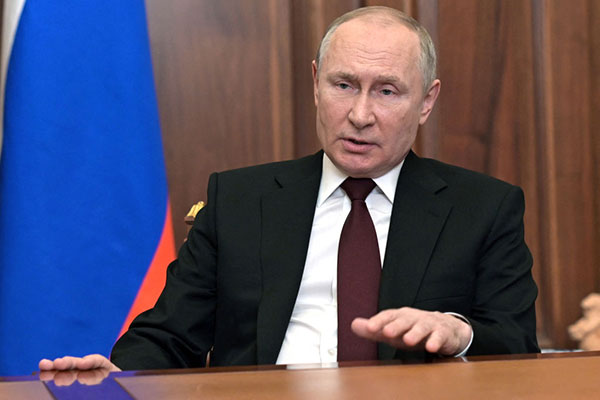Investors with Russian fund exposure remain in limbo
27th March 2023 12:40
by Cherry Reynard from interactive investor
Cherry Reynard explains how funds and investment trusts have fared and responded since last February’s invasion, as well as running through the dangers of political risk.

A year on from Russia’s invasion of Ukraine, any early hopes that the conflict may be short-lived have receded. Sanctions look set to remain for the long term, particularly as countries have started to adjust to a future without Russian fossil fuels. Funds investing in the region remain in limbo.
The decision is a complex one for investment managers. For the most part, they still can’t sell assets listed in Russia, but those assets may still have a value. Trading on the Moscow Stock Exchange continues, but only for local Russian investors and for ‘friendly’ foreign investors – i.e. those countries that have not imposed sanctions on Russia.
- Invest with ii: Buy Global Funds | Top Investment Funds | Open a Trading Account
This is not just a problem for investments listed in Russia. The strict capital controls on moving money in and out of Russia also affects Russian companies traded in London and New York.
Russian passive funds call it a day, while active funds remain suspended
Most Russian-dedicated exchange-traded funds (ETFs) took the decision to close after MSCI discontinued its Russian index series in March, including HSBC, DWS, Xtrackers, Invesco and BlackRock. Many ETFs had used the MSCI series as their reference benchmark. At the time of writing, only the FinEx ETF remained active.
Where funds have shut, investors have no hope of a payout in the short term. As it closed its ETF, HSBC said it would refund shareholders “in the event that it is possible to sell and realise any value from the fund's investments at a future date”.
The Russian-dedicated active funds remain suspended. For the HSBC GIF Russia fund and Liontrust Russia, the price continues to be calculated daily, but investors can’t cash in until sanctions are lifted. The management fees have been waived and companies are remaining tight-lipped about their future plans. It is unlikely that they will remain in this holding pattern indefinitely, but the reality for investors is that they are unlikely to realise any capital either way.
Other groups have gone down the path of restructuring. JPM Russian Securities secured board approval for a significant shift in its mandate. The trust has been renamed the JPMorgan Emerging Europe, Middle East & Africa Securities (LSE:JEMA), and now invests across central, eastern and southern Europe (including Russia) and the Middle East and Africa, using the S&P Emerging Europe, Middle East and Africa as its reference index. It currently has 8% in Russia and its share price is around one-eight of its pre-invasion highs.
Emerging market funds impacted
Barings Emerging EMEA Opportunities (LSE:BEMO) had expanded its remit from just Eastern Europe 12 months before the invasion and has nothing in Russia today. The Jupiter Emerging & Frontier Income had a weighting in Russia, but the investment trust has now closed (although for broader reasons than simply its Russian exposure).
Generalist emerging market funds with holdings in Russia – such as the Templeton Emerging Mkts Invmt Trust (LSE:TEM), BlackRock Greater Europe (LSE:BRGE) fund and JPMorgan Global Emerging Markets (LSE:JEMI) – have written those holdings to nil. The BlackRock fund had around 6% of its assets in Russia prior to the invasion. It says: “While there likely remains some intrinsic value in these businesses, it is difficult to see how this could be realised.”
- ‘High risk? I don’t see it that way’: the investment secrets of an ISA millionaire
- Three ways to generate £10,000 income this year
- Day in the life of a fund manager: abrdn’s Thomas Moore
While the pain has been felt most acutely by companies with direct holdings in Russia, in reality, few investors have been able to sidestep the consequences of the conflict. Many developed market companies had significant operations in Russia. BP (LSE:BP.), for example, had a 20% stake in Rosneft, Shell (LSE:SHEL) had joint ventures with Gazprom, Glencore (LSE:GLEN) also had a significant Russian business. Financials and consumer goods companies also had a presence there.
Yale University is keeping a list of companies that are maintaining, reducing or suspending their Russian operations. It lists 499 companies that are “temporarily curtailing most or nearly all operations while keeping return options open”. These include companies as diverse as Apple (NASDAQ:AAPL), Disney (NYSE:DIS), Estee Lauder (NYSE:EL) and Intel (NASDAQ:INTC).
Political risk can be detrimental to returns
It has become fashionable to say that political risk is largely unpredictable and even where it is, the impact on asset prices is difficult to judge. However, the conflict has been a grim reminder of why investors can’t neglect political risk in their investment decision-making. Some investment managers believe that in an era of deglobalisation and rising geopolitical tensions, this will become more important.
Anna Rosenberg, head of geopolitics at Amundi, is clear that investors will need to grow used to an environment with greater political risk – and not just in emerging markets.
She says: “Since the Brexit vote and then the election of Donald Trump, it has become clear that political considerations are becoming more important. Often, investors didn’t care too much about politics, they just cared about the numbers. But Trump, Brexit, Covid-19, have all had huge ramifications for financial markets. It is becoming more important to analyse political impacts.”

She points to the growing conflict between the US and China and the implications for trade, saying investors cannot afford to ignore it. “On the situation between China and Taiwan, for example, we’re watching out for incremental change.” She believes analysing potential impacts ahead of time can help manage crises as they arise.
In most cases, there will be a balance between risk and reward. The risk may be high, but there may still be an opportunity if the valuation is low. Adnan El-Araby, portfolio manager on the Barings Emerging EMEA Opportunities (LSE:BEMO), says: “It is important that analysts reflect how the political landscape could change the earnings profile of each company. The conflict in Ukraine created dislocations in the commodity market that had ramifications globally.
“Other examples include Greece, where we have reduced the risk premium to reflect the improving economic backdrop and business-friendly administration. Conversely, in Turkey, in light of the high inflationary environment, and unorthodox monetary policy response, we have increased the risk premium to account for these country-specific risks.”
- Buy and hold versus changing style: which fund approach is best?
- ISA ideas: alternatives to the most-popular funds and trusts
Christopher Rossbach, chief investment officer at J. Stern & Co, points out that “risk doesn't matter until it does”.
He adds: “It's why we have a risk framework that considers the possibility that situations can escalate. When we look at companies, we look to invest in companies with large global footprints and diversified revenue streams because it's very important to be able to absorb geographic and single-country risk.”
He believes the risk is often not worth taking. Rossbach points out: “We have rarely found there are companies whose rewards are so attractive that it warrants investing in countries such as Russia. On the contrary, there are lots of companies we can buy that fit our criteria that are invested in more mainstream markets. We own companies that do business in Russia, but it is a very limited proportion of our overall portfolio.”
Bonds don’t escape political risk
It is worth remembering that political risk also has an impact in bond markets. Unlike equity markets, however, Wall Street banks have been able to facilitate some trading in Russian government debt, enabling investors to sell out. Also, Russia remains a relatively small part of emerging market debt indices, so the impact on emerging market debt funds has been relatively small.
- Flight to cash for fund managers as economy fears grow
- Ian Cowie: the investment trusts in ISA millionaire club
Adrian Hilton, head of emerging market debt at Columbia Threadneedle Investments, says: “For us, political risk is a fact of life. The generous yields offered by emerging market sovereign bonds partly reflects a premium that investors require for allocating capital to economies where institutional frameworks tend to be less robust than in their developed market counterparts, where lower GDP per capita can incubate social tension, and where political stability cannot always be taken for granted.
“That’s not to say that political risk is confined to emerging markets – anyone trading UK Gilts or US Treasuries during 2016’s tumultuous events can attest to that.”
Political crises can provide opportunities
One final point worth noting is the disruption surrounding political shocks can turn up opportunities.
Robert Alster, chief investment officer at Close Brothers Asset Management, says: “Every crisis provides an opportunity from the perspective of an investor as there usually tend to be financial winners as well as losers.
“In the case of Russia/Ukraine, the global higher commodity prices meant that emerging markets that were commodity producers would gain, but those emerging markets who were net commodity importers would lose.
“Also, investors who primarily invest in long-term, high quality businesses often find that geopolitical crisis adversely affect the share prices of these businesses allowing investors to buy them at ‘fire sale’ prices.”
With the war still raging, there is little hope for a turnaround in Russian assets. Asset managers have little choice but to keep hold of their existing and highly impaired assets in the hope of an eventual resolution of the Ukraine conflict that potentially leads to an easing of Russia sanctions. For now, investors must remain in a holding pattern and make sure they pay closer attention to political risk from here.
These articles are provided for information purposes only. Occasionally, an opinion about whether to buy or sell a specific investment may be provided by third parties. The content is not intended to be a personal recommendation to buy or sell any financial instrument or product, or to adopt any investment strategy as it is not provided based on an assessment of your investing knowledge and experience, your financial situation or your investment objectives. The value of your investments, and the income derived from them, may go down as well as up. You may not get back all the money that you invest. The investments referred to in this article may not be suitable for all investors, and if in doubt, an investor should seek advice from a qualified investment adviser.
Full performance can be found on the company or index summary page on the interactive investor website. Simply click on the company's or index name highlighted in the article.